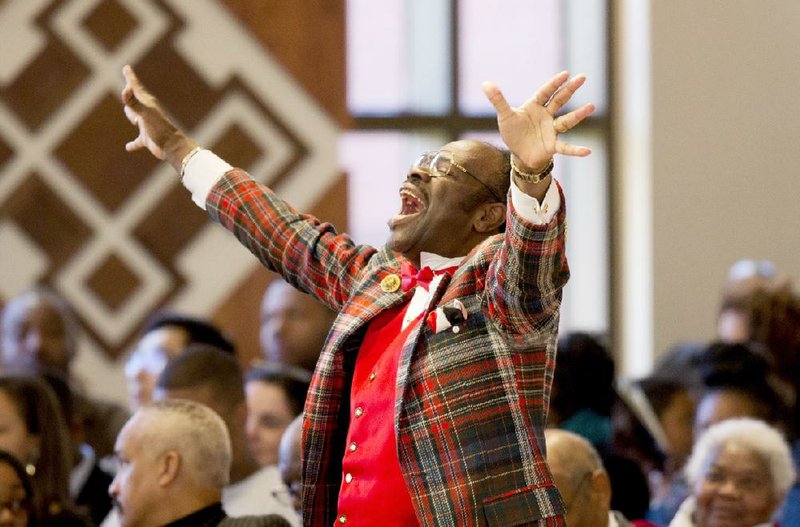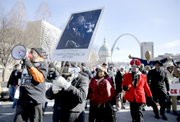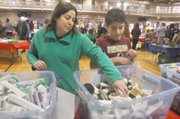COLUMBIA, S.C. -- Civil-rights leaders gathered Monday at the South Carolina Statehouse to pay homage to the Rev. Martin Luther King Jr. without the Confederate flag casting a shadow over them.
The banner was taken down in July, less than a month after police said a white man who had posed for photos with a Confederate flag shot nine black church members to death during a Bible study in Charleston. After the massacre at Emanuel African Methodist Episcopal Church, Republican Gov. Nikki Haley made it a priority for lawmakers to pass legislation to remove the flag.
"Isn't this a great day? It's so nice to be standing here and not looking at that flag," said Ezell Pittman, who had attended most of the anti-flag rallies on Martin Luther King Jr.'s Birthday holiday since they started in 2000. "I always had faith it would come down. I hate it took what it did but was real happy to see it go."
South Carolina NAACP President Lonnie Randolph said the flag's removal was tangible evidence the state cares about civil rights when pushed hard enough. But he warned that there would be other fights ahead.
"I promise you, the people that gather in this building -- your building -- will do something this year to cause us to return to ensure freedom, justice and equality is made possible for all people," Randolph said, motioning toward the Statehouse behind him.
Randolph promised to keep going to the Statehouse until King's dream is fully realized in a state with wide gaps in education achievement between school districts in rich, white communities and poorer, black ones, and where the governor and Republican-dominated Legislature have refused to take federal money to expand Medicaid.
About 1,000 people gathered at the Statehouse on a clear, cold day, drawn in part by appearances by all three Democratic presidential candidates -- Hillary Clinton, Bernie Sanders and Martin O'Malley.
Sanders, a U.S. senator from Vermont, reminded the crowd that King was a dynamic leader who wanted to help the poor. O'Malley, the former Maryland governor, said King would be ashamed that his country has made it harder to vote and easier to buy a gun.
Only Clinton spoke directly about the flag. The former secretary of state credited Haley and the Republicans with working with the NAACP after the church shooting.
"We couldn't celebrate [King] and the Confederacy. We had to choose," Clinton said. "And South Carolina made the right choice."
Across the country, the 30th anniversary of the holiday to honor the civil-rights leader assassinated in 1968 was commemorated in different ways.
In Atlanta, an overflow crowd showed up at Ebenezer Baptist Church to celebrate its former pastor's legacy at an annual commemorative service. The service capped more than a week of events under the theme: "Remember! Celebrate! Act! King's Legacy of Freedom for Our World."
While people have been distracted by TV reality shows and music "that tears down instead of uplifts," many injustices have occurred and "we're about to create right here in this civilized society the wild, wild west with guns," said King's daughter, the Rev. Bernice King.
"We can't keep being distracted, because if you're not careful, we're about to allow a reality show host to bully himself into becoming president of the United States of America," she said, referring to Republican presidential candidate Donald Trump.
The church's commemorative service typically draws elected officials, faith leaders and activists and is often dominated by political calls to action.
The Rev. William Barber II, the keynote speaker and president of the North Carolina chapter of the NAACP, spoke harshly about all of the presidential candidates who, in his view, tout King's words but defy his legacy.
"The further we get away from Dr. King's life, we must be careful, we cannot allow the same economic political establishment he opposed in life to reframe his message and make it more palatable for materialistic schemes," said Barber, who describes himself as a conservative Christian.
U.S. Housing and Urban Development Secretary Julian Castro told the church audience that King moved into a Chicago apartment on the city's west side 50 years ago and described seeing "a daily battle against depression and hopelessness" as babies were attacked by rats and children wore clothes too thin to protect against the Midwestern winter.
King's time in Chicago led him launch a campaign against discrimination in the sale or renting of homes.
"You see, Dr. King knew that housing was more than about just bricks and mortar," Castro said.
In the nation's capital, President Barack Obama and first lady Michelle Obama followed the King holiday theme of community service by planting vegetable seeds at a Washington elementary school to honor the civil-rights leader and celebrate Michelle Obama's initiative against childhood obesity.
They also stuffed bags with books for needy children, joining young people who participate in a White House mentoring program and volunteers from the AmeriCorps national service program.
In Michigan, people delivered bottled water to residents of Flint amid the city's drinking water crisis. In Minnesota, a rally against police brutality briefly shut down traffic on a bridge that spans the Mississippi River. Activists braved frigid temperatures as they marched onto the bridge, which connects Minneapolis and St. Paul, to protest the deaths of two black men shot by police last year in the Twin Cities.
In California, protesters from a Black Lives Matter offshoot group shut down one side of the San Francisco-Oakland Bay Bridge when they stopped vehicles in the westbound lanes and chained themselves and the cars together to form a line across the bridge.
Information for this article was contributed by Jeffrey Collins and Jeff Martin of The Associated Press and by Katie Leslie of Tribune News Service.
A Section on 01/19/2016


